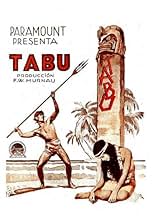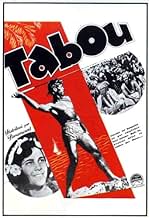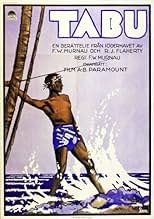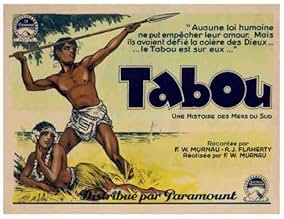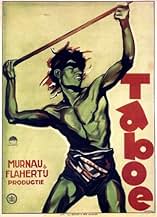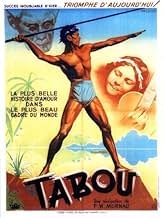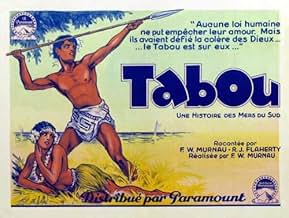Na ilha de Bora Bora, no Pacífico Sul, o amor de um jovem casal é ameaçado quando o chefe tribal declara a menina como virgem sagrada.Na ilha de Bora Bora, no Pacífico Sul, o amor de um jovem casal é ameaçado quando o chefe tribal declara a menina como virgem sagrada.Na ilha de Bora Bora, no Pacífico Sul, o amor de um jovem casal é ameaçado quando o chefe tribal declara a menina como virgem sagrada.
- Direção
- Roteiristas
- Artistas
- Ganhou 1 Oscar
- 4 vitórias no total
- The Girl
- (as Reri)
- The Policeman
- (as Jean)
- The Businessman
- (não creditado)
- The Captain
- (não creditado)
- Boys Friend
- (não creditado)
- Direção
- Roteiristas
- Elenco e equipe completos
- Produção, bilheteria e muito mais no IMDbPro
Avaliações em destaque
Although no members of the cast were professional actors, the performances by Matahi (as a young pearl fisherman) and Reri (as the `tabu' island girl) are moving. More than 70 years after its release, `Tabu' remains essential viewing, and UCLA's restoration of this classic has been a highlight of the schedule of new DVD releases in 2002. In fact, the film's luxurious black-and-white cinematography garnered cameraman Floyd Crosby an Oscar. DVD extras include audio commentary by UCLA Film Professor Janet Bergstrom; outtake footage; theatrical trailer; still gallery; short film titled `Reri in New York.'
The actors are real Polynesians and their ceremonies and rituals are faithfully captured, and interwoven with a tragic love story. The cinematography deservedly won an Oscar - it is truly beautiful. Murnau, away from his usual studio sets, manages to create the same sense of danger using natural light - especially moonlight - and real locations.
The performances are very strong - especially Chevalier as the girl, and the old man is as scary as Nosferatu as he haunts her dreams at night.
Sadly this was Murnau's last film - he died in a car crash just before the premiere. It is a little dramatically uneven, and certainly not the masterpiece that "Sunrise" is, but it is still very worthwhile.
Sadly, this was to be F. W. Murnau's last film. Despite a short life, he made many great films (including this one)... and then came a car accident that left us without another three or four decades of genius.
On the bright side, cinematographer Floyd Crosby won an Academy Award for Best Cinematography for his work on this film. Crosby went on to work for a great many years, bringing out the best in such directors as Roger Corman. In "Tabu", he uses the camera to tell a story without words -- body language and eye movement tell us almost everything we need to follow the plot.
The film was not a box office success upon release, grossing just $472,000 worldwide, which failed to recoup Murnau and Paramount's investment. This seems odd today, when it is considered a classic, but there is no secret that critically successful films and commercially successful films are not always the same thing.
The Image DVD features commentary by film historian Janet Bergstrom, which is quite excellent. Other editions feature other commentary, but I have not heard it and cannot compare.
The story is simple and direct. It's both a love story and a visual documentary that will appeal to Westerners accustomed to a more tech lifestyle. Parts of the narrative are conveyed by means of the writings in a ship captain's log. The writing is displayed on the screen, for viewers to read. The film's tone varies from light and cheerful at the beginning to more somber as the plot moves along.
Shot in Tahiti and Bora Bora, the film has a cast made up entirely of non-professionals. The B&W lighting is good, given the early era.
The film is one of the last of the silent period. And I'm therefore reluctant to find fault with it. The native Pacific music is really beautiful, what there is of it. I could have wished for a lot more. By contrast, the imported symphonic score is loud, nondescript, and intrusive. I guess that would be the one thing I would have changed.
Even for viewers who don't care for silent films, "Tabu: A Story Of The South Seas" might be appreciated for its documentary style visuals. For viewers familiar with silent cinema, this is a must-watch film, Director F.W. Murnau's last.
Você sabia?
- CuriosidadesProducer/director/co-writer F.W. Murnau died in a car accident a few days after starting work on the music for this film. It had its New York premiere a week later.
- Citações
The Girl: [writing a goodbye letter] I must go. Hitu is here and waits for me. You will die if I do not obey. I will go so that you may live. The tabu is upon us. I have been so happy with you far more than I deserved. The love you have given me, I will keep to the last beat of my heart. Across the great waters, I will come to you in your dreams when the moon spreads its path on the sea. Farewell.
- ConexõesEdited into Caça nos Mares do Sul (1940)
Principais escolhas
- How long is Tabu: A Story of the South Seas?Fornecido pela Alexa
Detalhes
- Data de lançamento
- País de origem
- Idioma
- Também conhecido como
- Tabu - Priča sa Južnih mora
- Locações de filme
- Empresa de produção
- Consulte mais créditos da empresa na IMDbPro
Bilheteria
- Orçamento
- US$ 150.000 (estimativa)
- Tempo de duração
- 1 h 26 min(86 min)
- Mixagem de som


